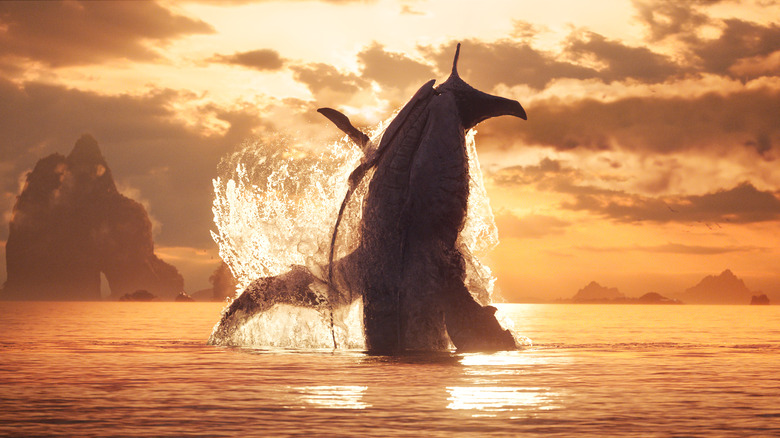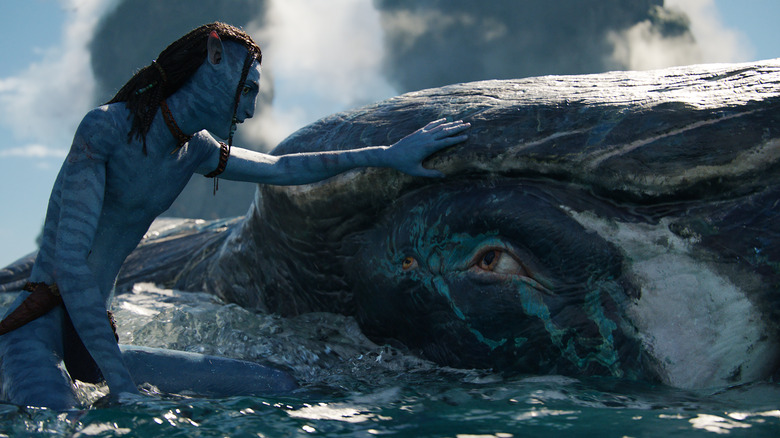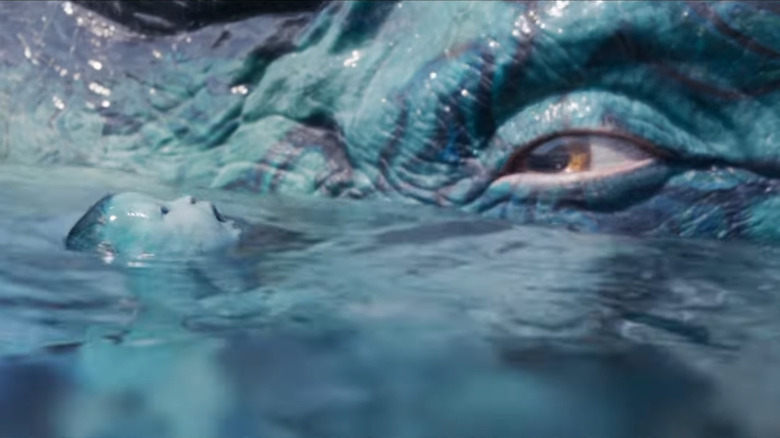Avatar: The Way Of Water Is The World's Most Expensive Commercial For Saving The Whales, And That Rules
This post contains mild spoilers for "Avatar: The Way of Water."
James Cameron's "Avatar" is many things — a movie with thrilling action set pieces, a vast world rich in mythology and detail, with some of the most incredible visuals ever put on film — but the film is also a giant, expensive, exhilarating excuse Cameron uses as an avenue to explore his passions as an environmentalist.
We've all heard and talked ad nauseam about how the first "Avatar" has a derivative plot and is essentially a rehash of "Pocahontas" and "Dances with Wolves," and while those things aren't untrue, and the plot about Unobtanium is kind of silly, it takes away from the fact that a major studio released a massive blockbuster that is all about deforestation, and that is no small achievement.
Now, "Avatar: The Way of Water" aims higher. The first of many — and possibly even more — sequels is bigger than its predecessor in every way. It has more (and better) characters, bigger set pieces, a larger world, more environments to play with, and a longer runtime to pack it all in. It is a movie aiming to push blockbusters to the next level, with a family saga that centers on the Sullys being on the run from a resurrected Colonel Miles Quaritch.
This is a massive movie, one that has to be massively successful just to break even. But what is even more impressive is that James Cameron convinced a studio to let him make "the worst business case in movie history," and he did it as an excuse to shoot a 3-hour-long commercial for saving the whales.
A very expensive political statement
Most of the story in "Avatar: The Way of Water" takes place away from the forests of Pandora and near its oceans, as the Sully family takes refuge with the Metkayina clan while on the run from the T-1000 ... I mean, Quaritch. While the Metkayina are very cool, with their unique physiology, fin-like tails, and Polynesian-inspired look and culture, it is the tulkun that steal the show.
The tulkun are essentially space whales, and they are hugely important to the Metkayina, who consider them siblings. Jake Sully's son Lo'ak even befriends a young tulkun named Payakan. It becomes clear rather quickly that the tulkun are more than just another cool alien special James Cameron is bringing into the fold, as Lo'ak is able to actually communicate with Payakan, who was a member of a proper society of tulkun until he was cast out for breaking a law, according to the other Metkayina.
These are very complex creatures, so of course, humans are hunting them down. It quickly becomes clear that the true villain of the film is not Quaritch with his personal vendetta, but Mick Scoresby, a literal space whaler with quotas to fill. Though the film is over three hours long, Cameron wastes no time getting to the point of the entire film by giving us an incredibly upsetting extended sequence of the whalers doing their job and hunting down a tulkun. Worse yet, they don't even use the whole animal, they dump the corpse after extracting what they wanted — a single vial of a little substance that is used in beauty products to stop aging, the new Unobtainium.
A possibly huge move
This is, of course, purposely similar to the real history of commercial hunting of whales for substances used to make wax, oil, and beauty products — something that persists to this day despite being wholly unnecessary, stupid, and hated by anyone with a beating heart and more than two brain cells. Sadly, whaling is still legal and practiced in many parts of the world including the U.S. and Canada.
Just like in the real world, "Avatar: The Way of Water" makes it clear the tulkun are hugely important to Pandora, and outright magnificent creatures. Jemaine Clement's Ian Garvin, a marine biologist doing research on the tulkun, says the space whales have intelligence as high as humans or Na'vi, complex emotions, and even music, religion, philosophy, and more. The Metkayina consider the tulkun their soul siblings, and have a deep emotional and psychological connection, telling each other stories and composing music. The tulkun aren't simply an animal species, they are a society as vital as the Na'vi.
Any movie can add a scene where a scientist describes an animal as worthy of respect or intelligent, but few make that animal feel as important to the world as the main humanoid characters — let alone hint at an entire civilization with society and culture — and directly draw a parallel between the destruction of said civilization and what we're allowing in our own world.
Then again, this is James Cameron, a longtime explorer of the ocean and environmentalist. The filmmaker literally released a documentary series all about how intelligent and emotional whales are last year, titled "Secrets of the Whales," so this is a passionate issue for him. More than the box office potential of the film, if "The Way of Water" gets a new generation to be interested and engaged in the preservation of whales, then it will all have been worth it.


